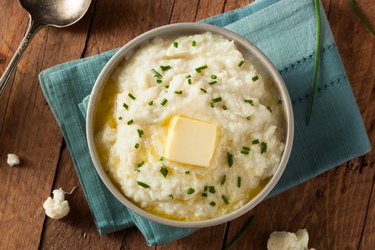
Once mashed potatoes reach the glue stage, there's no going back. Your potatoes may taste fine, but the thick, gloppy texture could be more than your guests can stomach. Aside from using the potatoes to create a new kind of side dish, the best thing you can do is learn what causes this gluey mashed potato mishap, then start over or apply this knowledge to your next batch.
From Great to Glue
Video of the Day
No matter the variety, potatoes contain starch. When you cook potatoes and begin mashing them, that action releases starch. Too much starch causes potatoes to go from great to glue. Unfortunately, once potatoes have released their starch, they can't un-release it. The three factors that lead to gluey potatoes are overworking, working too aggressively and using the wrong type of potatoes.
Video of the Day
The Right Tools
Tools such as electric mixers, food processors and blenders almost always cause the dreaded, unappealing, gluey consistency. These tools not only overwork the potatoes but they work them too aggressively. Instead, the USDA ChooseMyPlate website recommends using a fork or handheld potato masher to mash the potatoes until they're just broken apart. This method can lead to lumps, so if you want smooth potatoes, use a potato ricer instead of a potato masher to solve the lump problem, then use a wooden spoon to gently fold in melted butter and hot milk or cream .
The Right Potatoes
The wrong tools and too much handling aren't the only culprits that lead to gluey potatoes. The wrong types of potatoes set you up for mashing failure, no matter how you mash them. For perfect, fluffy potatoes, the University of Tennessee recommends high-starch varieties such as russets or all-purpose potatoes such as white Atlantic or Snowden or yellow varieties like Keuka Gold or Yukon Gold. High-starch potatoes readily absorb the flavors you add to your potatoes and when not overworked, produce fluffy to creamy mashed potatoes.
Fix Gluey Mashed Potatoes
It's true you can't fix gluey potatoes, but if you don't have the time or ingredients to make a new batch, there are a few things you can do to improve upon them. The easiest is to stir in some non-gluey mashed potatoes made from a starchy variety like russets to try to get some of the right texture back. This fix is hit or miss. Make plenty of gravy to go with the mashed potatoes and the gravy fans may not even notice the mistake.
Create a Casserole
Consider creating a different type of potato side dish by spreading the gummy mashed potatoes into a buttered casserole dish. Top the potatoes with butter, breadcrumbs and your choice of toppings such as shredded or Parmesan cheese, garlic, bacon or fresh herbs. Bake the casserole at 350 degrees Fahrenheit until the breadcrumbs become crisp and golden brown.
Make Potato Soup
As a last resort, if the gluey, gummy mashed potatoes are hopeless, make soup. Put most of the mashed potatoes into the blender or food processor. Add about the same amount of milk, buttermilk, cream or a mixture. You can also add a little hot chicken broth, melted butter, sauteed onions and garlic, lemon pepper and kosher salt to taste.
Pulse quickly, just to barely mix the potatoes into the liquid and other ingredients. Add a little more of the mashed potatoes if it's too thin. Pour the soup into the pot, along with any other cooked vegetables, such as carrots or peas, and warm gently until ready to serve. Garnish with chopped green onions, shredded carrots, bacon bits and shredded cheese.